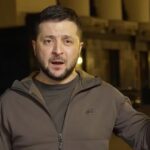
Armed with evidence of gruesome atrocities by Moscow’s troops against civilians, Ukrainian President Volodomyr Zelensky is expected to make an impassioned appeal to the United Nations Security Council on Tuesday for a full-scale war crimes investigation as his defense officials warned of a reinvigorated Russian assault in the eastern industrial heartland.
Despite a reprieve for the capital city, Kyiv, and surrounding areas, Ukraine’s military said Russian forces, largely repelled in the country’s north, were readying a fresh offensive in the Donbas region and in southern Ukraine.
Underscoring the peril faced by humanitarian workers trying to ease desperate hardships in besieged areas, a senior Ukrainian official said a Red Cross team detained near the strategic southern port of Mariupol had been released. But tens of thousands of residents remained in deadly peril in the encircled city.
The deputy Ukrainian prime minister, Iryna Vereshchuk, said there would be a new attempt Tuesday to open seven humanitarian corridors, all in eastern Ukraine. Previous efforts have often been derailed by fighting and Russian shelling.
The hasty Russian pullback from areas near Kyiv left behind harrowing signs of civilian suffering in once-placid suburbs seized in the invasion’s first weeks.
Grisly images that have emerged from the satellite town of Bucha in recent days, including those of corpses with hands tied behind their backs, are likely to be repeated elsewhere, Zelensky said in an overnight address.


He said the civilian death toll was expected to rise in areas near the capital and elsewhere that are being cleared by Ukrainian troops, adding to a government tally already exceeding 400 around Kyiv alone.
Moscow has scoffed at the growing body of evidence that its occupying troops targeted and tortured civilians, dismissing photos as staged and victim testimony as false. Zelensky said Russia had already launched a campaign to “conceal their guilt” in other previously captured areas.
Amid the growing international outcry, any call to action by the Security Council is likely to be blunted by permanent members China and Russia, although the United States and European governments have vowed to hold Moscow accountable.
The indications that noncombatants have been slaughtered and tortured are fueling calls for tougher sanctions. France’s minister of European affairs, Clement Beaune, told RFI radio that such a step by the European Union could come Wednesday, although there are divisions over the curtailment of Russian natural gas imports.
On Tuesday, three more EU countries — Italy, Denmark and Sweden — joined France and Germany in expelling dozens of Russian diplomats over the mounting proof of atrocities by Moscow.
In a signal of European solidarity, Ursula von der Leyen, the European Commission president, is to travel to Kyiv later this week, her spokesman said. She is to be accompanied by the top EU diplomat, Josep Borrell.


Those war-zone talks with Zelensky would be the latest in-person visit by high-ranking European officials since the invasion began Feb. 24. Last week, European Parliament President Roberta Metsola traveled to Kyiv bearing a “message of hope.” Last month, leaders from Poland, Slovenia and the Czech Republic took a risky train ride to Kyiv to express their support.
The Ukrainian capital, while seemingly out of immediate danger of a full-scale assault, still has the feel of a city ready for war. Most shops are still closed, but residents walk their dogs or go out for a jog in the late-winter chill, the weather hardly betraying the arrival of spring.
Residents have become accustomed to the matrix of checkpoints that block entrances and exits to neighborhoods — piles of sandbags covered in camouflage netting and some shredded fabric for additional concealment.
Burly troops in winter gear and body armor, toting assault rifles, check drivers’ IDs, as there is considerable concern about Russian infiltrators and saboteurs. On broad downtown boulevards, traffic appeared relatively light Tuesday morning, but vehicles lined up at checkpoints on the city’s periphery.
In the country’s east, Western analysts and officials have said they expect Russian forces to push to expand beyond the territory where the Kremlin has fomented an 8-year-old separatist conflict.
The Ukrainian military’s General Staff wrote on Facebook that, in the Donetsk and Luhansk regions, Russian forces were trying to take control of the cities of Popasna and Rubizhne, while continuing to lay siege to Mariupol, whose capture would be key to establishing a land bridge with the Crimean peninsula, which Russia seized in 2014.
“The enemy is regrouping troops and concentrating its efforts on preparing an offensive operation in the east of our country,” the statement said, adding that the objective was “full control over the territory of Donetsk and Luhansk regions.”
British military intelligence said in an assessment Tuesday that Ukrainian forces had reasserted control of some crucial northern terrain, including areas around the city of Chernihiv and north of Kyiv, although it said low-level fighting might persist in some of those areas.
Many of those Russian units, however, will be unable to redeploy to eastern Ukraine until they have undergone significant refitting, the assessment said.
With nearly a quarter of Ukraine’s population displaced by war, and more than 4 million seeking safety beyond its borders, the biggest movement of refugees seen within Europe since World War II has prompted action from some unusual quarters.
In scenes carried live Tuesday by Japan’s national broadcaster NHK, 20 Ukrainian refugees arrived from Poland on a flight arranged by the foreign minister in a high-profile show of support. There are already about 400 Ukrainian refugees in Japan.
McDonnell reported from Kyiv and King from Budapest, Hungary.
This story originally appeared in Los Angeles Times.




